江苏专转本英语_高频词汇辨析
- 格式:doc
- 大小:132.00 KB
- 文档页数:34
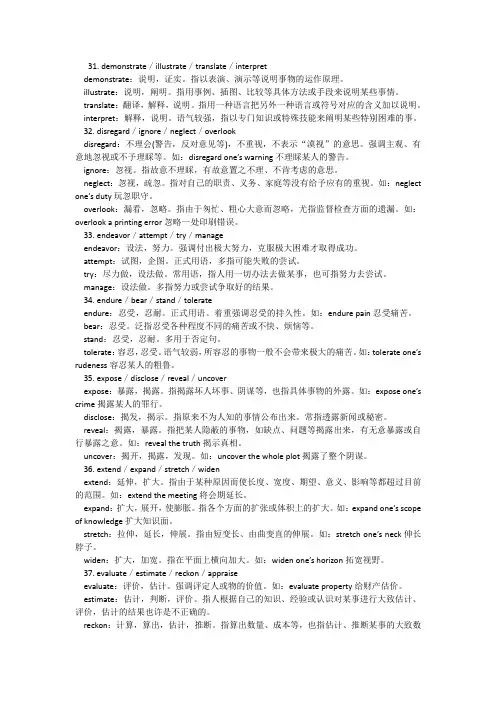
31. demonstrate/illustrate/translate/interpretdemonstrate:说明,证实。
指以表演、演示等说明事物的运作原理。
illustrate:说明,阐明。
指用事例、插图、比较等具体方法或手段来说明某些事情。
translate:翻译,解释,说明。
指用一种语言把另外一种语言或符号对应的含义加以说明。
interpret:解释,说明。
语气较强,指以专门知识或特殊技能来阐明某些特别困难的事。
32. disregard/ignore/neglect/overlookdisregard:不理会(警告,反对意见等),不重视,不表示“漠视”的意思。
强调主观、有意地忽视或不予理睬等。
如:disregard one’s warning不理睬某人的警告。
ignore:忽视。
指故意不理睬,有故意置之不理、不肯考虑的意思。
neglect:忽视,疏忽。
指对自己的职责、义务、家庭等没有给予应有的重视。
如:neglect one’s duty玩忽职守。
overlook:漏看,忽略。
指由于匆忙、粗心大意而忽略,尤指监督检查方面的遗漏。
如:overlook a printing error忽略一处印刷错误。
33. endeavor/attempt/try/manageendeavor:设法,努力。
强调付出极大努力,克服极大困难才取得成功。
attempt:试图,企图。
正式用语,多指可能失败的尝试。
try:尽力做,设法做。
常用语,指人用一切办法去做某事,也可指努力去尝试。
manage:设法做。
多指努力或尝试争取好的结果。
34. endure/bear/stand/tolerateendure:忍受,忍耐。
正式用语。
着重强调忍受的持久性。
如:endure pain忍受痛苦。
bear:忍受。
泛指忍受各种程度不同的痛苦或不快、烦恼等。
stand:忍受,忍耐。
多用于否定句。
tolerate:容忍,忍受。
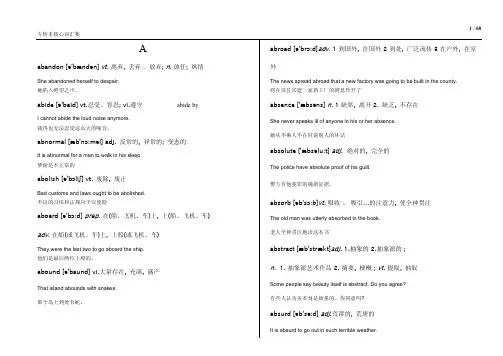
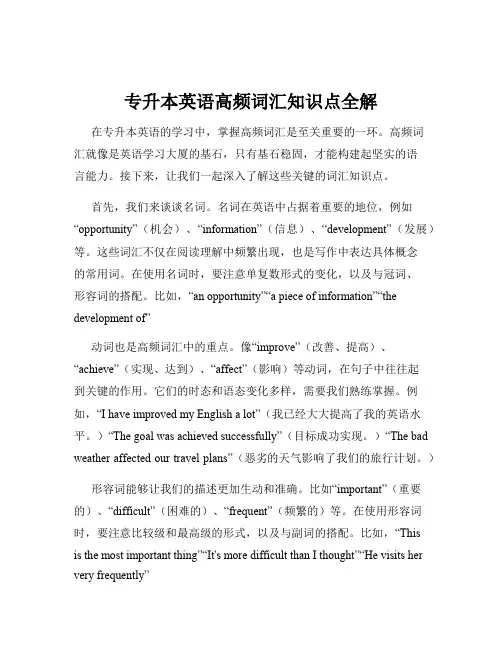
专升本英语高频词汇知识点全解在专升本英语的学习中,掌握高频词汇是至关重要的一环。
高频词汇就像是英语学习大厦的基石,只有基石稳固,才能构建起坚实的语言能力。
接下来,让我们一起深入了解这些关键的词汇知识点。
首先,我们来谈谈名词。
名词在英语中占据着重要的地位,例如“opportunity”(机会)、“information”(信息)、“development”(发展)等。
这些词汇不仅在阅读理解中频繁出现,也是写作中表达具体概念的常用词。
在使用名词时,要注意单复数形式的变化,以及与冠词、形容词的搭配。
比如,“an opportunity”“a piece of information”“the development of”动词也是高频词汇中的重点。
像“improve”(改善、提高)、“achieve”(实现、达到)、“affect”(影响)等动词,在句子中往往起到关键的作用。
它们的时态和语态变化多样,需要我们熟练掌握。
例如,“I have improved my English a lot”(我已经大大提高了我的英语水平。
)“The goal was achieved successfully”(目标成功实现。
)“The bad weather affected our travel plans”(恶劣的天气影响了我们的旅行计划。
)形容词能够让我们的描述更加生动和准确。
比如“important”(重要的)、“difficult”(困难的)、“frequent”(频繁的)等。
在使用形容词时,要注意比较级和最高级的形式,以及与副词的搭配。
比如,“Thisis the most important thing”“It's more difficult than I thought”“He visits her very frequently”接下来是副词,“frequently”(频繁地)、“carefully”(仔细地)、“probably”(可能地)等副词常常用来修饰动词、形容词或整个句子。
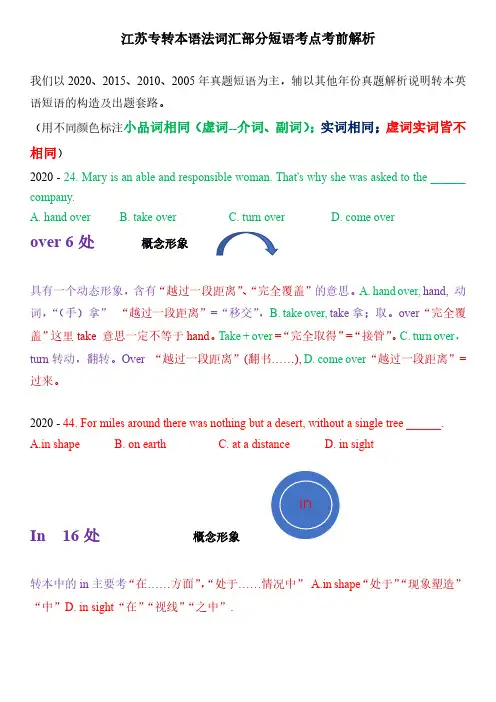
江苏专转本语法词汇部分短语考点考前解析我们以2020、2015、2010、2005年真题短语为主,辅以其他年份真题解析说明转本英语短语的构造及出题套路。
(用不同颜色标注小品词相同(虚词--介词、副词);实词相同;虚词实词皆不相同)2020 - 24. Mary is an able and responsible woman. That's why she was asked to the ______ company.A. hand overB. take overC. turn overD. come overover 6处 概念形象具有一个动态形象,含有“越过一段距离”、“完全覆盖”的意思。
A. hand over, hand, 动词,“(手)拿” “越过一段距离”=“移交”,B. take over, take 拿;取。
over “完全覆盖”这里take 意思一定不等于hand 。
Take + over =“完全取得”=“接管”。
C. turn over ,turn 转动,翻转。
Over “越过一段距离”(翻书……), D. come over “越过一段距离”=过来。
2020 - 44. For miles around there was nothing but a desert, without a single tree ______.A.in shapeB. on earthC. at a distanceD. in sightIn 16处 概念形象转本中的in 主要考“在……方面”,“处于……情况中” A.in shape “处于”“现象塑造”“中”D. in sight “在”“视线”“之中”.on 7处概念形象1概念形象2转本及考试中on有两个考点“依靠”、“持续”,由于on earth不是答案且语义固定,我们用其他年份的举例:2010- 32. The company ____many fine promises to the engineer in order to get him to work for them.A. held upB. held onC. held outD. held ontohold on “坚持不懈”,包含有“持续”意思。
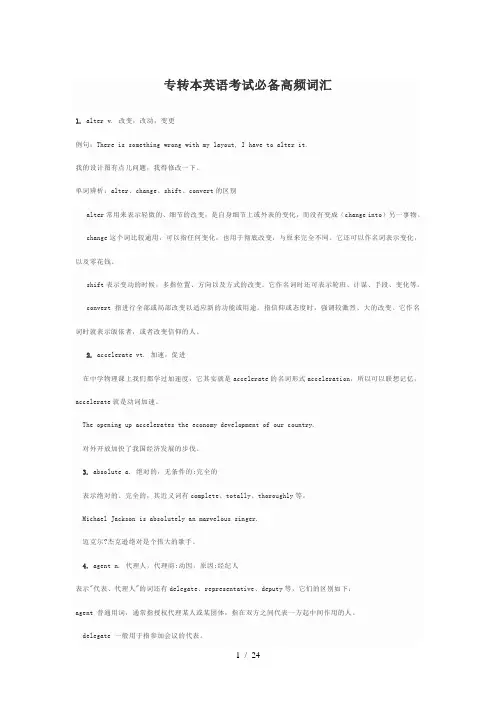
专转本英语考试必备高频词汇1. alter v. 改变,改动,变更例句:There is something wrong with my layout, I have to alter it.我的设计图有点儿问题,我得修改一下。
单词辨析:alter、change、shift、convert的区别alter常用来表示轻微的、细节的改变,是自身细节上或外表的变化,而没有变成(change into)另一事物。
change这个词比较通用,可以指任何变化,也用于彻底改变,与原来完全不同。
它还可以作名词表示变化,以及零花钱。
shift表示变动的时候,多指位置、方向以及方式的改变。
它作名词时还可表示轮班、计谋、手段、变化等。
convert指进行全部或局部改变以适应新的功能或用途。
指信仰或态度时,强调较激烈、大的改变。
它作名词时就表示皈依者,或者改变信仰的人。
2. accelerate vt. 加速,促进在中学物理课上我们都学过加速度,它其实就是accelerate的名词形式acceleration,所以可以联想记忆,accelerate就是动词加速。
The opening up accelerates the economy development of our country.对外开放加快了我国经济发展的步伐。
3. absolute a. 绝对的,无条件的;完全的表示绝对的、完全的,其近义词有complete、totally、thoroughly等。
Michael Jackson is absolutely an marvelous singer.迈克尔?杰克逊绝对是个伟大的歌手。
4. agent n. 代理人,代理商;动因,原因;经纪人表示"代表、代理人"的词还有delegate、representative、deputy等,它们的区别如下:agent 普通用词,通常指授权代理某人或某团体,指在双方之间代表一方起中间作用的人。
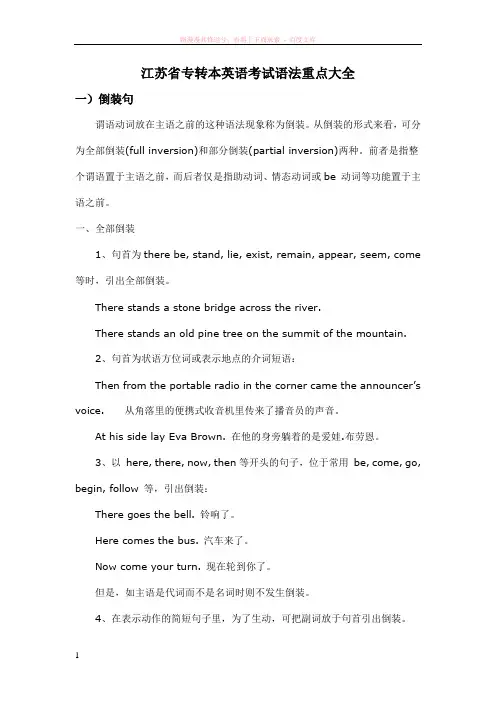
江苏省专转本英语考试语法重点大全一)倒装句谓语动词放在主语之前的这种语法现象称为倒装。
从倒装的形式来看,可分为全部倒装(full inversion)和部分倒装(partial inversion)两种。
前者是指整个谓语置于主语之前,而后者仅是指助动词、情态动词或be 动词等功能置于主语之前。
一、全部倒装1、句首为there be, stand, lie, exist, remain, appear, seem, come 等时,引出全部倒装。
There stands a stone bridge across the river.There stands an old pine tree on the summit of the mountain.2、句首为状语方位词或表示地点的介词短语:Then from the portable radio in the corner came the announcer’s voice.从角落里的便携式收音机里传来了播音员的声音。
At his side lay Eva Brown. 在他的身旁躺着的是爱娃.布劳恩。
3、以here, there, now, then等开头的句子,位于常用be, come, go, begin, follow 等,引出倒装:There goes the bell. 铃响了。
Here comes the bus. 汽车来了。
Now come your turn. 现在轮到你了。
但是,如主语是代词而不是名词时则不发生倒装。
4、在表示动作的简短句子里,为了生动,可把副词放于句首引出倒装。
Out rushed the dog from the gate. 一条狗从大门里嗖地一声窜了出来。
Up went the rocket into the sky. 火箭嗖地一声飞上了天空。
但:Away they went.5、在表达祝愿的句子里:Long live the friendship between American and Chinese people! 中美人民的友谊万岁!May you succeed! 祝你成功!6、在强调表语时Worst of all were the humiliations. 最令人难以忍受的是羞辱。
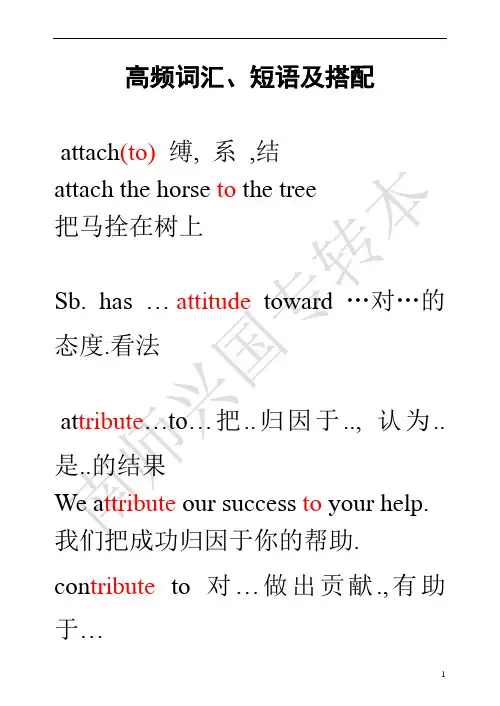
高频词汇、短语及搭配attach(to)缚, 系,结attach the horse to the tree把马拴在树上Sb. has …attitude toward …对…的态度.看法at tribute…to…把..归因于.., 认为..是..的结果We a ttribute our success to your help. 我们把成功归因于你的帮助.con tribute to 对…做出贡献.,有助于…He contributed to our success.他对我们的成功做出了贡献.dis tribute sth. among sb. 分配/分发某物.\\distribute money among usassign 指派分配的是工作或任务assignment(be) aware of意识到,知道.He is aware of the danger. 危险know sthhave some idea about sthreal ize sth 意识到+danger 危险recognize 辨认出I recognized him among the crowd.在人群中我把他认出来了.be based on / upon 基于The theory is based on practice.base基础具体名词军事基地basis基础抽象名词begin with 以…开始.The meeting began with his speech.会议刚开始首先由他发言.to begin with (=) 首先, 第一(经常用于开始语)To begin with, first, firstly, first of all, in the first place, most important of all,其次second, secondly, in the second place, next最后finally, at last, in the end, in the last placeon behalf of以…名义代表…He is on behalf of our class. 他代表我们班.benefit(from) 动词, 受益,得到好处.We can benefit from morning exercises. 晨练对我们有益.= profit frombenefit 利益,好处profit 利润经济方面的重述法We can benefit from morning exercises. 晨练对我们有益.Every one of us, no matter who we are, whether we are old or young, may profit from exercises in the morning every day, such as jogging, climbing hills and buildings, and playing football and so on and so forth.A young manA man who is youngfor the benefit of sb为了…的利益(好处)thank you for your helpblame sb. for sth. 因…责备某人 . 例: blame him for the accident责备他因为这次事故criticize him 批评他comment on sth. 评论on board 到船上, 在船上, 上火车或飞机home and abroad国内外out of breath 喘不过气来in brief简言之=总之To sum up, in a word, in conclusion, on business 出差办事.case事情; 案例; 病例in….case 在…情况下in most cases 在大多数情况下in any case无论如何,在任何情况下, in no case在任何情况下都不no=not anyin case+从句(=for fear that)万一; 以防…in case of +名词如果发生…万一because +原因状语从句because of+名词带上雨衣以防天下雨.Take the raincoat in case of rain.Take the raincoat in case it should rain/rains.1) in charge of负责(某事)He is in charge of the company.他管理这家公司.in the charge of …由…管The company is in the charge of him.in front ofin the front of2) charge…for 因…索取(费用) , The hotel charges us 100 dollars for a room. 这家旅馆向我们收价100 美元.free of charge 免费3) charge sb. with sth. 控告某人犯有…\accuse sb. of sthcompare A with B 把…与…比较compare…to… 把…比作…He compares love to red rose.他把爱情比作成红玫瑰.contrary to (=in opposition to) 与…相反on the contrary 相反however, nevertheless ,yet, 副词转折关系, 然而butHe has not arrived yet.He is very rich, but he is not happy. He is very rich. Yet, he is not happy.in contrast to/with +sth 介词短语后要加名词和…形成对比by contrast对比之下副词短语放在句首, 用逗号和主句隔开.whileHe is playing while we are reading.complain t名词complain to sb. about sth. 向某人抱怨…;He complained to the manager about the poor service.他向经理投诉较差的服务. ///////centre =centerconcentrate on (or upon) sth集中,专心pay attention to sthbe concerned with (=about) 与…有关例: The novel is concerned with the life of the poor in the 18th century.这部小说描述的是18世纪穷人的生活状况.concern oneself about / with 关心例:He concerned himself about thepoor.on condition that (=if)以…为条件, 假如. 如果…引导条件状语从句in that = because 因为; 在于…as; sinceHis advice is important in that it can help us.now that = since 既然for all that = although 尽管in condition / out of condition 健康状况好/不好.in good (bad) condition处于良好(坏)状态confide in对…讲真心话, 依赖I have confidence in you对…有信心I am confident有信心的,自信的confidential 机密的firm 坚定的confirm sb. in sth使某人更坚定(信念等)comrade companyThis fact confirmed me in his honesty.A conform to B.符合,遵照,遵守; form 形式congratulate sb. on sth. 祝贺Congratulations!be conscious of(=be aware of)觉察,知道as a result of由于…的结果=because of=due to =owing to +原因consider 动词考虑;思考considerate体贴的, 考虑他人需要的,It is considerate you to do that for us.你为我们做这一切考虑真的很周到assist 协助shop assistant 助手consist of(=be composed of)由…组成的.例:The medical team consists of two doctors and four nurses.这个医疗队是由两名医生和四名护士组成.The medical team is made up of two doctors and four nurses.be made up of =be composed of ////// up1)向上,----downGo upget up2)完整,完全eat up 吃光了use upmake-upconsist in主要在于.under control (被)控制住out of control无法控制convince sb. of sth使某人确信, persuade sb. to do sth.劝说某人去`做…at the cost of 以…为代价成本,花费in (during) the course of the exam 在…过程中course 期间out of date过时的;up to date新式的,时兴的;come up to me 向我走来despite (=in spite of)不管, 尽管In spite of difficulties, we will go ahead.尽管有困难, 我们仍需坚持向前.in detail 详细地He described the accident in detail. detail 名词细节on a diet吃某种特殊饮食, 节食go on a dietdistinguish A from B把…与…区别开tell the differences between A and Bhave…to do with 与…有关系A have something to do withB 有关A have nothing to do with B 无关without doubt (=un doubt edly)无可置疑地easywith ease 容易, 不费力be at (one’s) ease自在,不拘束feel at homeeffect 名词效果效应affect 动词影响the theory affects our life.influence动词名词深远地影响have an effect/influence on 对…有影响The theory has an effect on our life.be in effect (=be in operation) 有效operate 做手术; 操作,place(or put, lay) an emphasis on 强调, 把重点放在…上动词原形过去式过去分词lie 说谎lied lied lying lie 躺着/座落lay lain lying lay 放置laid laid laying I __laid__ the book on the table.He __lay__ on the meadow.on end (=continuously) 连续地in the end (=finally, eventually) 最终at the end of the classin the beginningat the beginning ofend up with a success以…而结束end up in hospitalend up in prisoncome to an end (=finish)结束the meeting came to an end. ///be engaged in sth/doing sth忙于,从事be busy doing sthHe is too busy to come here.be entitled to sth.有权…,有资格…we have the right to do sth 权利leftbe equal to等于平等A is similar toB in appearance.the same asThey are alikeThe two plans are a like.exchange…for 以…交换exchange an apple for a bananakeep an eye on照看,监视in the face of 面对着(困难等情况) in the face of difficulties /troubles face sth 动词面对be faced with sth 面对着…fall into the habit (of) 养成…习惯habit 个人的习惯hobby 个人的业余爱好interest 个人的兴趣custom 地方或团体的风俗tradition 传统带有一种守旧in fashion时兴,流行popular songsin favour of 赞成…I am in favor of your idea.(be) favour able to有利的The situation is favorable to us. 形势,局势favor ite最喜欢的my favorite bookA is super ior to B.A is inferior to Blatest 最近的,最新的feed on sth. 靠吃…,用…喂养He feeds on meat.depend onrely onbe fed up with厌烦, 腻了up 向上; 完全He came with me. 伴随He wrote with a pen. 工具,凭借He is angry with me. 原因TV setset up 建立s b. set sth. on fire(=set fire to sth.)使..着火,放火Sth catch fire 着火The museum caught fire.at first sight乍一看,一见at the sight of sth 一看到….seein sight 在视线范围内out of sight 从视线中消失了think ----thought 想法,名词at the thought of sth一想到…./////////////////////for the first time 第一次(作状语)be fond of sth 喜欢,喜爱某物would/should like to dowant to doprefer to dointend to do 打算做mean to do 打算去做mean doing/sth.意味着…(be) in force有效, 实施The law is in force.by force 靠武力, 强行in general (=in most cases, usually)通常来说Generally speaking,general 大致上的,通常的common共同拥有的eg. our common interest ordinary 平凡的an ordinary man usual和往常一样的as usual和往常一样He got up at 6 as usual.average 平均的take…for granted把…认为理所当然的.We took it for granted that he would come here.We suppose that he…假定姑且认为come to a halt突然性停止; 停住stop to do 停下来去做某事stop doing 停止做某事cease to do = stop doingat hand 在手边, 眼前(附近)by hand 用手工(做)within reachout of reach够不到beyond reach 超越in one’s honour (or in honour of sb.)祝贺,纪念The hospital is built/set up in his honor.The hospital is named after him. ///////be ignorant of对…不了解,不知道have got some idea of sthhave no idea of sthhave=have gotimpose…on 把…强加给impose tax on usexpress 表达im press…on 给…留下印象I a m deeply impressed by his speech. 演讲被…深深地打动了make (leave) an impression on sb. =give sb. an impression 给…留下印象be indifferent to对…漠不关心, 冷淡,不在乎He is in different to the poor.He is cold to the poor.(be) inferior to 比…差;A is super ior to B.比…好superman supermarketinform sb. of sth. 及时通知, 告诉information age 信息tell sb. sth =tell sth to sb.take the place of sb. 取代某人instead of (=in place of) 代替,而不是…介词He went to school instead of going to park.instead 副词He didn’t go to park.Instead, he went to school.be interested in sth 对…感兴趣be fond of sth. 喜爱…be keen on sth. 热衷于at intervals 每隔一会儿, 每隔一段距离inter---nation---al 国际上的invest in 投资investmentbe involved in卷入,He was in volved in the trouble.join 参加组织或团体join the army join the Partyjoin in =take part in =participate in 参加某种活动join in the activity活动act---act ive---activ ityact ion名词抽象的长期的行为act 动词行动名词具体的一次行为He was praised for his brave__act__. Action speaks louder than words.by himselfby itself单独地,靠自己in itself 本身; 本质上的of itself 自发,自然The question is _____not difficult, but it needs our patience and care.at large 一般来说, 大体上;=in general =generally speakingat least至少;--- at most 至多be at one’s leisure 在…有空的时候when you are free=in your free timeat length终于;详细地at last =finally 终于in detail 详细地length 长度----longbe liable to易于..的,应受(罚)be subject to the cold 易患感冒be prone to。
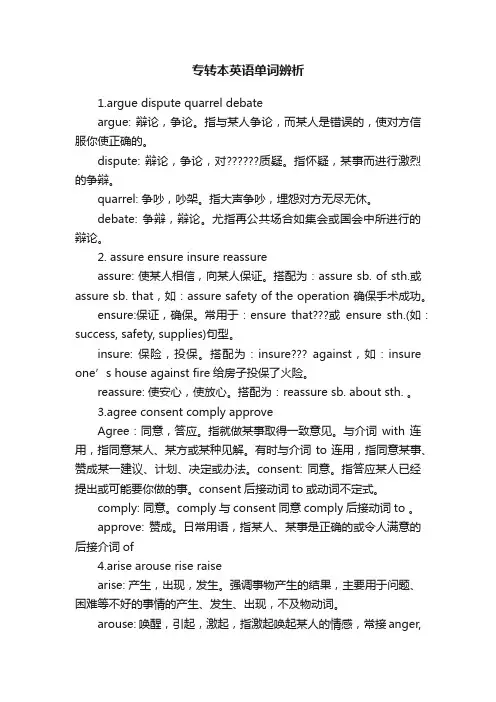
专转本英语单词辨析1.argue dispute quarrel debateargue: 辩论,争论。
指与某人争论,而某人是错误的,使对方信服你使正确的。
dispute: 辩论,争论,对质疑。
指怀疑,某事而进行激烈的争辩。
quarrel: 争吵,吵架。
指大声争吵,埋怨对方无尽无休。
debate: 争辩,辩论。
尤指再公共场合如集会或国会中所进行的辩论。
2. assure ensure insure reassureassure: 使某人相信,向某人保证。
搭配为:assure sb. of sth.或assure sb. that,如:assure safety of the operation 确保手术成功。
ensure:保证,确保。
常用于:ensure that或ensure sth.(如:success, safety, supplies)句型。
insure: 保险,投保。
搭配为:insure against,如:insure one’s house against fire给房子投保了火险。
reassure: 使安心,使放心。
搭配为:reassure sb. about sth. 。
3.agree consent comply approveAgree:同意,答应。
指就做某事取得一致意见。
与介词with连用,指同意某人、某方或某种见解。
有时与介词to连用,指同意某事、赞成某一建议、计划、决定或办法。
consent: 同意。
指答应某人已经提出或可能要你做的事。
consent后接动词to或动词不定式。
comply: 同意。
comply与consent同意comply后接动词to 。
approve: 赞成。
日常用语,指某人、某事是正确的或令人满意的后接介词of4.arise arouse rise raisearise: 产生,出现,发生。
强调事物产生的结果,主要用于问题、困难等不好的事情的产生、发生、出现,不及物动词。

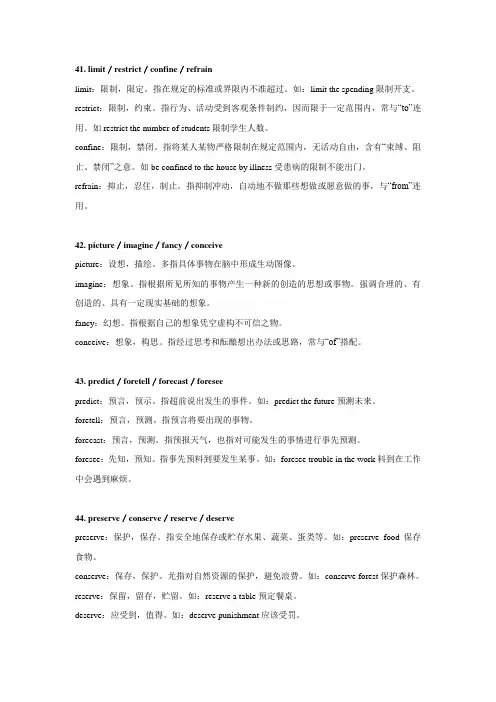
41. limit/restrict/confine/refrainlimit:限制,限定。
指在规定的标准或界限内不准超过。
如:limit the spending限制开支。
restrict:限制,约束。
指行为、活动受到客观条件制约,因而限于一定范围内,常与“to”连用。
如restrict the number of students限制学生人数。
confine:限制,禁闭。
指将某人某物严格限制在规定范围内,无活动自由,含有“束缚、阻止、禁闭”之意。
如be confined to the house by illness受患病的限制不能出门。
refrain:抑止,忍住,制止。
指抑制冲动,自动地不做那些想做或愿意做的事,与“from”连用。
42. picture/imagine/fancy/conceivepicture:设想,描绘。
多指具体事物在脑中形成生动图像。
imagine:想象。
指根据所见所知的事物产生一种新的创造的思想或事物。
强调合理的、有创造的、具有一定现实基础的想象。
fancy:幻想。
指根据自己的想象凭空虚构不可信之物。
conceive:想象,构思。
指经过思考和酝酿想出办法或思路,常与“of”搭配。
43. predict/foretell/forecast/foreseepredict:预言,预示。
指超前说出发生的事件。
如:predict the future预测未来。
foretell:预言,预测。
指预言将要出现的事物。
forecast:预言,预测。
指预报天气,也指对可能发生的事情进行事先预测。
foresee:先知,预知。
指事先预料到要发生某事。
如:foresee trouble in the work料到在工作中会遇到麻烦。
44. preserve/conserve/reserve/deservepreserve:保护,保存。
指安全地保存或贮存水果、蔬菜、蛋类等。
如:preserve food保存食物。
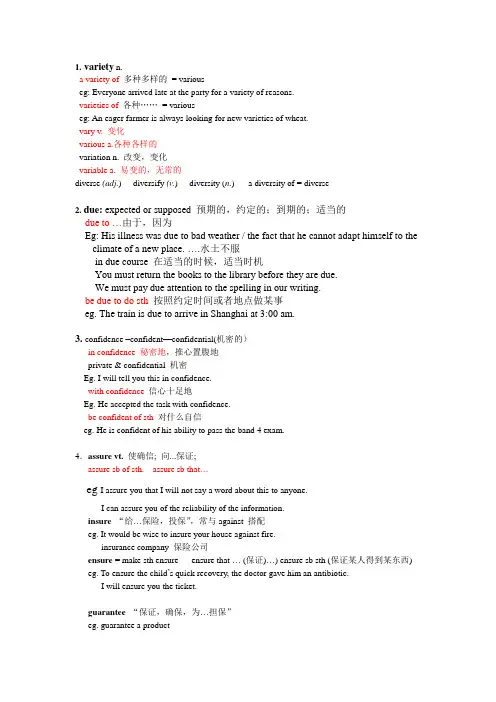
1. variety n.a variety of多种多样的= variouseg: Everyone arrived late at the party for a variety of reasons.varieties of 各种……= variouseg: An eager farmer is always looking for new varieties of wheat.vary v. 变化various a.各种各样的variation n. 改变,变化variable a. 易变的,无常的diverse (adj.)----diversify (v.)----diversity (n.)---- a diversity of = diverse2. due: expected or supposed 预期的,约定的;到期的;适当的due to …由于,因为Eg: His illness was due to bad weather / the fact that he cannot adapt himself to the climate of a new place. ….水土不服in due course 在适当的时候,适当时机You must return the books to the library before they are due.We must pay due attention to the spelling in our writing.be due to do sth按照约定时间或者地点做某事eg. The train is due to arrive in Shanghai at 3:00 am.3. confidence –confident—confidential(机密的)in confidence 秘密地,推心置腹地private & confidential 机密Eg. I will tell you this in confidence.with confidence 信心十足地Eg. He accepted the task with confidence.be confident of sth对什么自信eg. He is confident of his ability to pass the band 4 exam.4.assure vt. 使确信; 向...保证;assure sb of sth. assure sb that…eg I assure you that I will not say a word about this to anyone.I can assure you of the reliability of the information.insure “给…保险,投保”,常与against 搭配eg. It would be wise to insure your house against fire.insurance company 保险公司ensure = make sth ensure ensure that … (保证)…) ensure sb sth (保证某人得到某东西) eg. To ensure the child’s quick recovery, the doctor gave him an antibiotic.I will ensure you the ticket.guarantee “保证,确保,为…担保”eg. guarantee a productTake this opportunity, and I guarantee that you won’t regret it.It is still under guarantee, so the manufacture will repair it. (仍在保修期)Give a guarantee of one’s good behaviour.5.conquer (vt): defeat or overcome 克服, 征服eg. It is very hard to conquer bad habits.conquerable (adj.)→ conqueror (n.) 征服者, 胜利者→ conquest (n.) 征服conquer和overcome辨析conquer:征服,多指用暴力或斗争使其他事物置于控制之中。
专转本英语高分常用核心词汇词汇部分1江苏专转本高分常用词汇bolish vt.①废除(法律、习惯等)②取消abundance n.丰富,充裕accommodate vt.①向…提供住处(或膳宿)②容纳③使适应adjacent adj.毗连的,接近的,临近的aggravate vt.①加重,使恶化②激怒,使恼火alienate vt.与…疏远,离间allocate vt.①分配,配给②把(物质资金等)划归,把…拨给arrogant adj.傲慢的,自负的ascertain vt.查明,弄清assault n.(武力或头上的)攻击,袭击‖vt.突击,攻击/vi.动武betray vt.①背叛,出卖②辜负③泄漏,暴露bias n.①(成衣等的)斜线②偏见,癖好‖adj.& adv.斜‖vt.(常用被动语态)使有偏见,使有倾向性blink u.眨眼睛,眯着眼睛看bonus n.①额外津贴②奖金③红利bribe n.①贿赂②行贿物‖vt.向…行贿,收买brittle adj.①易碎的,脆弱的②易爆的③易损坏的,不永久的④(声音等)尖利的⑤冷淡的browse v.浏览,翻阅(书刊)capsule n.①(医)囊,胶囊②(植)蒴果,孢蒴③(空)气密小座舱,容器,特封壳cardinal adj.①基本的,根本的②深红色的‖n.①红衣主教②深红色cater vi.①供应伙食,提供娱乐节目②迎合,投合census n.①人口调查,人口普查②(人口调查得来的)统计数字‖vt.调查(地区等)的人口数字,统计…的数字chaos n.混乱,无秩序circulation n.①(货币、消息等的)流通,传播②(报刊等)发行③(血液等)循环,(空气等)流通clone n.克隆,无性繁殖‖vt.克隆(动物)cluster n.(果实、花等的)串,族;(人或物的)群,组‖vi.丛生;群集cognitive adj.认知的,识识的coincidence n.①巧合,巧事②(意见、爱好、利益等的)一致,符合compact adj.紧凑的,不巧的,袖珍的‖vt.使…压实(塞紧),使坚实,使…紧密结合compile vt.汇编,编制,编纂conception n.①思想,观念,概念②构想,设想③怀孕cylinder n.①圆柱体,圆筒②汔缸,泵体decree n.法令,政令‖vt.颁布(法令)degenerate vi.衰退,堕落,蜕化‖adj.堕落的‖n.堕落者deputy n.①副职,副手②代表,代理人dignity n.①(举止、态度等的)庄严,端庄②尊贵,高贵discriminate vi.①区别,辨别②有差别对待,歧视divert vt.①使转向,使改道②转移③转移…的注意力domain n.①(活动、思想等)领域,范围②领地,势力范围duplicate vt.①复制,复写,复印②重复‖n.完全一样的东西,复制品‖a dj.完全一样的,复制的eclipse n.①(日、月)蚀②(地位、声誉等的)消失,黯然失色‖vt.使暗淡,使失色,使…相形见绌empirical adj.①经验主义的,凭经验的②经验的,来自经验的enterprise n.①企业,公司②(艰巨或带冒险性的)事业,计划③事业心,迸取心episode n.①(许多事件中的)一个事件②(戏剧、小说等中的)插曲,情节;(连载小说中的)一工了;(连续剧的)一集escort n.①护卫者,护送者②护送,护卫,伴随‖vt.护,护送exceptional adj.①优秀的,卓越的②例外的,独特的,罕见的,异常的execution n.①死刑,处决②(计划等的)实行,(命令、职务等的)执行expire vi.①期满,到期②断气,死亡facilitate v.使…易做,使…便利;促进,有助于feeble adj.①(身体)虚弱的②(声音、力气、光线等)微弱的,无力的③无效的,无益的fixture n.①(常复数)(房屋等的)固定装置②长期固定于某地(或某项工作)的人(或物)flutter vi.①(旗子等)飘动,飘扬②拍翅,展翅而飞③(脉搏、心脏)快速跳动‖n.激动不安,紧张fossil n.化石frantic adj.①(因忿怒、痛苦或欢乐而)激动得发狂②狂暴的furious adj.①勃然大怒的,大发雷霆的②强烈的,猛烈的gigantic adj.巨大的,庞大的glamour n.①魅力,诱惑力②迷人的美,妖艳‖vt.①迷惑,迷住②使有魅力‖adj.热门的glitter vi.①(因反射而)闪闪发光②(眼睛)发亮,闪光‖n.①闪光,灿烂的光辉②(眼睛)发亮,闪光grim adj.①残酷的,冷酷无情的②严厉的,严肃的③(口语)讨厌的,糟糕的handicap n.①(身体或智力上的)缺陷②妨碍,不利条件‖vt.妨碍,使不利hostage n.人质hurl vt.①向…猛投,力掷②(向…)大声吐(恶言),大声嚷ignite v.引燃,点火,着火/vt.激起,使激动illuminate vt.①照明,照亮,使变亮②阐明immerse adj.①使沉浸于,使陷入,使专心一地②沉浸imperative adj.①必要的,迫切需要的必须服从的,命令式的‖n.必要的事,必须完成的事implicit adj.①暗含的,暗示的②(in)内隐的,固的有③无疑问的,无保留的indicative adj.表明,说明,象征的(常接of)industrious adj.勤劳的,勤奋的innovation n.①革新,创新改革,②新方法,新事物inscribe vt.写,刻,题字insulate vt.①使孤立,隔离②使绝缘,使隔热,使隔音integrate v.使合而为一,使合并,使成一体(with ,into)intensify v.加剧,加强,加紧intersection n.交叉(点),道路交叉口,十字路口。
专升本英语高频词汇解析在专升本的英语考试中,掌握高频词汇是取得好成绩的关键之一。
高频词汇在阅读理解、写作、翻译等各个题型中都频繁出现,对理解和表达起着重要的支撑作用。
接下来,让我们深入解析一些常见的专升本英语高频词汇。
首先是“abandon”这个词,它常见的意思是“放弃;抛弃”。
比如“He abandoned his hope of becoming a doctor”(他放弃了成为医生的希望。
)在使用时,要注意它的名词形式“abandonment”。
“accommodate”也是高频词汇之一,意思是“容纳;提供住宿;适应”。
“The hotel can accommodate up to 500 guests”(这家旅馆可容纳多达 500 位客人。
)这个词的用法较为灵活,需要我们在不同的语境中准确理解其含义。
“accumulate”意为“积累;积聚”。
例如,“He accumulated a large fortune over the years”(多年来他积累了一大笔财富。
)其名词形式是“accumulation”。
“accurate”表示“准确的;精确的”。
“The information he provided was very accurate”(他提供的信息非常准确。
)它的副词形式“accurately”也经常出现在考试中。
再来看“acknowledge”,常见释义为“承认;答谢”。
“He acknowledged his mistake”(他承认了自己的错误。
)“acquire”有“获得;取得”的意思。
“She acquired a good knowledge of English through hard work”(她通过努力学习获得了良好的英语知识。
)“adapt”意思是“适应;改编”。
“He adapted himself to the new environment quickly”(他很快适应了新环境。
51. ability/capacity/capability/potentialability:能力,才能。
指某人做某事的能力和才干,特别指后天习得的才干和能力。
capacity:能力,容量。
用于人,指接受能力、理解力或全部能力的总和;用于物,指生产能力或容纳能力。
capability:才能,天资。
指先天赋予的在某方面的突出才能。
potential:潜能,潜力。
如:realize one’s potential认识到自己的潜能。
52. accident/incident/event/occurrenceaccident:事故。
指意外发生的事故,如车祸、摔伤等。
incident:事件,事变。
指次要的事件,也指引起国际纠纷或战争的政治性事件。
event:事件,时事。
指历史上的重大事件。
occurrence:发生,事件。
指偶然发生的事件,特别指普通的或家庭中的事件,如:an everyday occurrence每天都发生的事。
53. affection/emotion/feeling/passionaffection:情感,爱。
指对某人所怀有的美好的情感,如爱、慈爱。
emotion:情感,情绪。
指强烈而且能感染人的情绪,如喜、怒、哀、乐等。
feeling:感觉,情绪。
指人对外界刺激表现出来的心理状态。
如欢乐、忧愁等;有时指生理受到刺激而产生的感觉,如寒冷、疼痛等。
passion:激情,热情。
指强烈的感情,如愤怒、喜爱等。
54. appliance/equipment/instrument/deviceappliance:器具,设备。
指较小的器具,如电炉、电风扇等电器。
如:electrical appliances(家电)。
equipment:设备,装备。
指成套的设备。
instrument:仪器,器械。
指精细工作或科学上所用的仪器。
device:设备,装置。
指为专门用途而设计的小型器械。
55. base/basis/foundation/rootbase:基地,基础。
complaint about 抱怨concern about 关心,照顾doubt about (of) 对…的怀疑discussion about (of, on) 讨论information about 有关…的信息opinion about (on) 对…意见2. 名词+againstcomplaint against 控诉caution against 提防insurance against 保险precaution against 预防protection against 防护spite against 怨恨struggle against 与…斗争war against 对…的战争warning against 告诫3. 名词+foraffection for 对…的爱ambition for 有…的抱负anxiety for 焦虑,担心attraction for 吸引capacity for 做…的能力care for 关心,喜欢cause for …的起因consideration for 考虑contempt for 对…藐视cure for 治…的良药/疗法demand for 对…需求excuse for …的借口explanation for (of) 对…的解释fine for 因…而罚款longing for 渴望necessity for 对…的需求passion for 对…的酷爱preference for 偏好preparation for 准备punishment for 因…而受罚reason for …的理由regret for 因…而后悔reputation for …的名声request for 对…要求,请求requirement for …的要求,条件respect for 对…尊敬responsibility for 对…的责任substitute for …的替代品sympathy for 对…的同情talent for 有…的天赋absence from 缺席divorce from 与…离婚,脱离retirement from 从…退休shelter from 躲避freedom from 摆脱relief from 免除,解除5. 名词+inbelief in 对…的信仰,信任break in 强行闯入;插嘴,打断change in 在…方面的变化decrease/fall/decline/drop in 在…方面的减少increase/rise in 在…方面的增加delight in 喜欢faith in 对…信任progress in 在…方面的进步success in 在…上的成功trust in 对…的信任6. 名词+intodevelopment into 发展成inquiry into 对…调查、询问insight into 对…深刻理解,洞见investigation into 对…的深入调查research into 研究study into 对…的研究7. 名词+ofattack of 患…病care of (=in care of) 由…转交command of 对…精通,掌握doubt of 对…怀疑dream of …的梦想the idea (thought) of 对…想法impression of 对…的印象intention of …的意图lack of 缺少neglect of 对…的疏忽opinion of 对…的看法8. 名词+onattack on 攻击authority on …方面的权威comment on 对…发表评论congratulation on 祝贺dependence on 依赖effect on 影响emphasis on 对…强调impact on 影响(leave/make an) impression on对…留下印象improvement on 对…的改进influence on 对…的影响judgement on 根据…的判断lecture on 有关…的讲座mercy (pity) on 怜悯operation on 给…动手术pressure on 对…的压力reliance on 依赖remark on 对…的评论9. 名词+overadvantage over 比…优越authority over 对(某人)的控制、管理权力choice over 先于…的选择,不选择…control over 对…的控制increase over 比…增加power over 对…的权力preference over 比…更喜欢,先于…的选择priority over 比…优先superiority over 比…优越,优于10. 名词+toaccess to 接近,…的通路accident to 发生于…的事故admission to 准许进入…answer to 对…回答approach to …的方法assent to 同意attention to 对…的注意attitude to (toward) 对…态度blindness to 对…不知clue to …的线索contribution to 对…的贡献door to 通向…的门entrance/entry to 通向…的入口exception to …的例外exposure to 接触,暴露于gratitude to 对…感激guide to …的指南indifference to 对…无动于衷introduction to …入门,介绍,引见key to …的答案,…的关键marriage to 与…结婚monument to …的纪念碑objection to 反对opposition to 反对preface/forward to …的前言reply to 答复respond to 对…的回答,答复;对…响应,反应;(药物)有效resistance to 抵制…ratio to 与…之比right to …的权力solution to …的答案traitor to …的叛徒,背叛…11. 名词+withacquaintance with 与…认识alliance with 与…联盟bargain with 与…讨价还价chat with 与…闲谈coincidence with 与…的巧合collision with 与…相撞connection with 与…相关consultation with 与…协商conversation with 与…交谈correspondence with 与…通信familiarity with 与…熟悉harmony with 与…和谐the matter with …有问题/麻烦patience with 对…耐心转转本英语备考资料之常考易混近形词111组1. aboard adv., prep. 在船(车/飞机)上,上船(车/飞机) abroad adv. 国外,海外board n. 木板;董事会;(包饭的)伙食 vt.上(船,车等)broad adj. 宽的,广阔的,广泛的2. abstract adj. 抽象的 n. 摘要,梗概attract vt. 吸引:be attracted to迷恋,喜欢subtract vt. 减去(from)3. accent n. 口音,重音access n. 接近(或进入)的,机会;通道,入口assess vt. 对…进行估价,评价excess n. 超过,过量 adj.过量的,额外的asset n. 财产,资产exception n. 例外4. accident n. 事故;意外,偶然之事incident n. 发生的事;事变,事件5. acquire vt. 取得,获得,学得enquire (in-) vt. 询问,打听require vt. 需要;要求,规定request n.要求,请求 v.要求,请求6. adapt vt. 使适应,使适合 vi.适应(to)adopt vt. 收养;采取,采用7. affect vt. 影响;引起感情波动effect n.效果,影响 vt.实现,产生…的结果infect vt. 传染,感染defect n. 缺点,缺陷effort n. 努力,精力afford vt. 负担得起,买得起,花得起(时间等);供给,给予8. alive adj. 活着的(作表语或后置定语);有活力的,有生气的live adj. 活的,有生命的(只用于物,放在名词前);现场直播的lively adj. 充满活力的,活泼的;栩栩如生的living adj. 活着的(可形容人或物,可作表语或定语)9. alone adj. (作定语)(实际上的)独自一人,孤单一人adv. 单独lonely adj. (心理上的)孤独的,寂寞的lone adj. (正式)孤单的,孤独lonesome adj. 寂寞的,冷清的10. amaze vt. 使惊愕amuse vt. 使…消遣、娱乐11. altitude n. 高度,海拔attitude n. 态度,看法12. amplify vt. 放大,增强magnify vt. 放大,扩大multiply vt. 使成倍增加;使相乘13. applicable adj. 适用的;有效的,生效的applicant n. 申请人applied adj. 实用的,应用的14. appreciate vt. 感激;评价,欣赏appeal n. 呼吁;控拆;吸引力vi.呼吁,求助于approve v. 批准;赞许apply v. 申请;应用,运用;适用15. arise vi. 出现,产生;站起来,起身arouse vt. 惊醒,叫醒;引起;唤起,唤醒raise vt. 举起;使升起;增加,提高rise vi. 起身;起床;升起;上涨,增高16. ashamed adj. 渐愧,害臊shameful adj. 可耻的,不道德的shameless adj. 无耻的,不要脸的17. assignment n. (分派的)任务,作业;分配assessment n. 估价,评价18. assist v. 帮助,协助consist vi. 组成(of);在于(in)insist v. 坚持观点,坚决主张(on)persist vi. 坚持(做下去)resist v. 抵抗,反抗;忍住,经受19. assume vt. 假定,设想consume vt. 消耗,花费resume v. (中断后)继续20. assure vt. 向…保证;使有保证: ~sb. of/thatensure vt. 保证,保证有,使一定得到: ~ thatinsure vt. 给…(经济意义上的)保险: ~ sth. againstreassure vt. 使放心secure adj. 安全的;可靠的;放心的21. attain vt. 达到;获得vi. 达到contain vt. 包容,容纳,装有maintain vt. 维持;保养;坚持认为;赡养retain vt. 保留,保持sustain vt. 供养;支撑,承受;经受22. attraction n. 吸引(力);有吸引力的人或事物attention n. 注意,注意力23. available adj. (用于物)可利用的,可得到的;(用于人)可见到的acceptable adj. 可接受的approachable adj. 可接受,可处理的attainable adj. 可达到的applicable adj. 可应用的;适当的,合适的24. awake adj. 醒着的vt. 唤醒,使觉醒vi. 醒来,醒悟到awaken vt. 使觉醒,唤醒wake vi. 醒来 ~ up唤醒;使觉悟waken vi. 醒来vt. 弄醒,叫醒25. award n. 奖品,奖金vt. 发给,给予(奖品等)reward n. 报答,报酬vt. 报酬,酬谢26. blast v. 炸毁n. 爆炸;一阵,一股(风)burst n. 爆烈;突发的一阵v.爆裂,爆炸;突然发生(牙,蕾等)绽开;充满(with) 27. bounce n. 弹,反弹v. (使)弹起,(使)弹起,(使)跳起bound n. 边界,界限v. 限定boundary n. 边界,界线28. confirm vt. 使有效,批准;证实,确认confine vt. 限制,使局限于;禁闭conform vi. 遵守,符合confess v. 承认,坦白;忏悔29. comment n. 评论,意见v. 评论commentary n. 解说(词)30. compete v. 竞赛,竞争complete adj. 完整的;完成的vt.完成,(使)完整31. conceive v. 设想,构思deceive v. 期骗,蒙骗perceive vt. 觉察,感知;认识到,理解32. conscience n. 良心consciousness n. 意识,知觉33. consequently adv. 所以,因此subsequently adv. 随后34. conserve vt. 节约,保护preserve vt. 保存;保护,维护;腌渍reserve vt. 保留,储备;预订(定) n. 储备物,储备金,沉默寡言35. custom n. 习惯,风俗,惯例customs n. 海关,关税costume n. 服装36. continual adj. 不断的;频繁的continuous adj. 连续的,持续的37. contact n. vt. 接触,联系contract n. 合同,契约vi. 订合同;缩小,收缩contrast n. 对比,对照vt. vi. 对比,对照contrary adj. 相反的n. 相反(的事物);对立面38. continually adv. 老是,不断地(有短暂间隔的)continuously adv. 连续不断地(不中断)39. continuance n. 持续期间continuation n. 继续,持续continuity n. 连续性40. counsel n. 忠告,劝告;法律顾问,辩护人vt.忠告,劝告council n. 委员会,理事会41. dairy n. 牛奶场,乳品店;乳制品adj. 牛奶的,乳品的diary n. 日记,日记簿42. dead adj. 死的,死寂的deadly adj. 致命的;像死了似的,极度的,非常的deathlike adj. 死一般的,可怕的deathly adj. 死一般的,致死的adv. 死一般地43. decent adj. 正派的,得体的;体面的;相当好的descent n. 下降,降下;遗传,血统descend vi. 下来,下降;遗传vt. 沿着…走下来ascend vt. 攀登vi.升,上升44. dedicate vt. 奉献,供奉;献身,致力delicate adj. 纤细的,娇嫩的45. defect n. 缺点,缺陷defend vt. 保卫,防卫;为…辩护46. definite adj. 明确的,确定的infinite adj. 无限的,无穷的,无边无际的define vt. 解释,下定义;限定,规定47. destination n. 目的地,终点distinction n. 差别,不同;杰出48. deduce vt. 推论,演绎reduce vt. 缩小,减少;简化;使成为49. different adj. 差异的,不同的;indifferent adj. 冷漠的,不关心的(to)50. desert n. 沙漠,不毛之地dessert n. 甜食,点心51. distant adj. 遥远的distinct adj. 清楚的distinctive adj. 有区别的,有特色的52. economy n. 经济;节约,节省economics n. 经济学economist n. 经济学家53. economic adj. 经济上的;经济学上的economical adj. 节约的,节省的54. efficient adj. 效率高的;有能力的sufficient adj. 充分的,足够的55. electric adj. 电的,由电操纵的,由电产生的electrical adj. 与电有关的56. electric adj. 出现,涌现;冒出,(事实)暴露electrical adj. 潜入水中 vt.淹没,浸没57. emergence n. 出现←(emerge)emergency n. 紧急情况,不测之事58. emigrant n. 移出之移民 adv.移出国的migrant n. 移民adj.移居的immigrant n. 移入之移民,侨民adj.(从外国)移来的,移民的59. emigrate v. 移居国外immigrate v. (从外国)移来,移居入境migrate vi. 移居(国外);(候鸟等的)迁徙60. employment n. 职业,工作;使用employee n. 雇员employer n. 雇主61. especial adj. 特别的,尤其的special adj. 特殊的,专门的;专用的specific adj. 明确的,具体的;特定的;特效的(药)62. exception n 除外,例外expectation n. 期待,期望;料想63. explore v. 勘探,探险;探究,探索explode vt.使爆炸(裂) vi.爆发,爆炸expose vt. 使暴露,揭露expand v. 扩大,膨胀64. extensive adj. 广泛的,广阔的,深远的intensive adj. 集中的,深入的expansive adj. 扩张的,膨胀的expensive adj. 昂贵的,花钱多的65. extension n. 伸展,扩大;延长,延期;(电话的)分机expansion n. 扩大,膨胀66. formal adj. 外形的,形式的;正式的former n. 前者adj.先前的67. generous adj. 大方的,慷慨的genuine adj. 真正的;真诚的68. honorable adj. 光荣的;可尊敬的honorary adj. 名誉的69. idleness n. 闲散laziness n. 懒惰70. imaginable adj. 可想象的imaginative adj. 想象力丰富的imaginary adj. 想象中存在的,虚构的71. imitate vt. 模仿;仿造intimate adj. 亲密的;私人的72. inferior adj. 下等的,下级的;劣等的,次的superior adj. (职务等)上级的;优越的;优质的,较好的73. interpret v. 解释,说明;翻译,口译interrupt v. 打断,打扰;中断74. late adj.迟的,晚的;已故的 adv.迟latter adj.后者的;后一半的,接近终了的n.后者last adj. 最后的later adv. 后来,过一会儿latest adj. 最近的,最新的75. loyal adj. 忠诚的,忠心的royal adj. 王室的,皇家的76. most adv. pron. 大多数mostly adv. 大多数,大部分,主要地,在多数情况下77. note n. 便条;笔记;注解;票据,钞票notice n.注意,察觉;通知,布告 vt.注意到,察觉到78. nuisance n. 令人讨厌的人或事nonsense n. 废话,胡说79. present vt. 提供,赠送represent vt. 代表;表示;描绘80. optimistic adj. 乐观的,乐观主义的optional adj. 选择性的;任选的,随意的81. perspective n. 视觉,观点,想法;远景prospective adj. 未来的,预期的82. physician n. 内科医生physicist n. 物理学家83. precious adj. 珍贵的,贵重的previous adj. 先,前,以前的;在…之前(to)84. principal n.负责人,校长 adj.最重要的,主要的principle n. 原理,原则85. possess vt. 占有,拥有process vt.加工,处理n.处理,进程86. precede v. 先于,领先,先行proveed vi. 进行,继续下去87. produce v.制造,生产;引起,产生n.农产品(总称,不可数)product n. 产品,产物,成果(可数)production n. 生产(不可数);产量(不可数);作品productivity n. 生产率88. promote vt. 促进;提拔progress n.进步,进展;前进vi.前进;进展proceed vi. 继续前进;继续(做某事)propose vt.建议;打算vi.求婚89. protect vt. 保护,保卫protest v.抗议,反对n.(against)抗议,反对90. release vt. 释放;发布,发行;放开,松开relieve vt. 解除,缓解;救济,解救;使…免除relate vi.有关,涉及vt.使有关联;叙述;讲述91. respectable adj. 受人尊敬的,值得敬重的respectful adj. 对人尊敬的,恭敬的,礼貌的respective adj. 各自的,分别的92. respectively adv. 分别地,分别为respectfully adv. 恭敬地,尊敬地respectably adv. 可敬地93. reveal vt. 使露出,展现;透露,泄露revise vt. 修订,修正;复习rewrite vt. 改写,重写reserve vt. 保留,储备;预订(定)reverse v.颠倒;反转,倒退n.反转;反面;相反的情况adj.相反的;倒转的94. route n. 路线,路程routine n.例行公事,惯例,惯常的程序adj.例行的,常规的95. sample n.样品,抽样vt.从…中抽样,取样specimen n. 标本,样本96. scene n. (戏的)一场;(故事,事情)发生地;布景,舞台;风景scenery n. (全新的)风景,景色;舞台布景97. sensible adj. 感觉得到的;明智的,通情达理的sensitive adj. 敏感的;灵敏的(to)98. spit vi.吐唾沫(痰)vt.吐出n.唾液split v.(使)裂开,劈开,撕开n.裂口;分裂99. stationary adj. 静止的,固定的stationery n. 纸张文具(总称)100. strip n.窄带vt.剥夺vi.脱衣stripe n. 条子,条纹101. successful adj. 成功的successive adj. 连续的,连接的102. staff n. 全体职工,全体人员;参谋部stuff n.原料vt.填满,塞满103. statue n. 塑像,雕像status n. 地位,身份state n. 状态104. transform vt. 改变,变形;改造transfer vt.转移,调动;转让vi.迁移,调动transport vt.运输,运送n.运输,运送transmit vt. 传送,传递;播送,发射105. trap n.陷井,圈套vt.诱捕trick n.诡计,花招;把戏;窍门v.欺骗106. track n.跑道,小路;踪迹vt.追踪trace n.踪迹,痕迹vt.追踪107. unlike adj.不同的,不相似的prep.不像…dislike n.不喜欢vt.不喜欢,厌恶alike adj. 相同的,相像的108. usage n. 惯用语,惯用法;使用use vt.运用;使用n.运用,用途109. variable adj. 易变的,可变的,变化的,不稳定的variant adj.变异的n.变体,变形various adj. 各种不同的,各式各样的;许多,很多110. variance n. 不同: at~(with)与…不一致,意见不合variation n. 变化,变动;变量variety n. 多样性;种种,种类111. wander vt. 漫游,闲逛,走神,(神情)恍惚wonder vi.感到惊讶(at)vt.想知道n.惊奇,奇迹专转本英语词汇备考默认分类1.confident和confidantconfident“深信,确信,自信”。
学习好资料欢迎下载326个专转本高频词汇1.tend2.involve3.includermation5.offer6.level7.require8.issue9.condition10earn11.rate12.control13.process14.avoid15.focus16.affect17.credit18.environment19.fail20.feature21.impactck23.major24.range25.refer26.replace27.seek28.suggest29.abilitymunication31.contain32.expense33.ignore34.injure35.limit36.mature37.particular38.pick39.specific40.stick41.store42.amount 43.appeal44.associate45.assume46.benefit47.cultivate48.distance49.edit50.exchange51.factor52.indicate53.media54.refuse55.suffer56.treat57.various58.apply59.attack60.available61.awardmit63.crisis64.effective65.employ66.entire67.exhaust68.growth69.incident70.incidentally71.accidentally72.preference73.supply74.adapt75.adopt76.advocate77.approach77.approve78.circumstance79.consume80.convey81.creative82.crime83.define84.efficient85.emotion86.expectation87.express88.failure89.mannerd91.mood92.object93.objective94.subjective95.pace96.participate97.purchase98.relieve99.review100.secure101.source102.stuff103.symbol104.throw105.urgent106.abstract107.acceptable108.adjust109.amuse110.assist111.bargain112.barrier113.campaignbatposition116.concept117.continual118.cope119.continuous120.dissolve121.emphasis122.exact123.exposure124.faint125.fatigue126.frighten 127.genuine128hint129.insert 130.nervous 131.normal 132.procedure 133.property 134.regulate 135.release 136.relevant 137.represent 138.resist 139.specialize 140.temper 141.tough 142.undergo 143.vision 144.yield 145.absorbed 146.abundant 147.application 148.appointment 149.arrange 150.attraction 151.attractive 152.beneficial 153.boast burst 154.chase 155.chill156.clumsy 157.coastal petent pose 160.confront 161.connect 162.constant 163.content 164.controversy 165.convenient 167.coordinate 168.count c ultural 169.demonstrate 170.descend 171.discipline172.dispute173.distribute174.embrace175.enclose176.equip177.essential178.exhibition179.expansion180.exploit181.extent182.favorable183.generous184.grip185.harsh186.fierce187.severe188.imitate189.initiate190.innocent191.insult192.insure193.assure194.interval195.lest196.liable197.offend198.offensive199.operate200.oppose201.origin202.outstanding203.parallel204.parking205.practical206.preferable207.dictate208.disapprove209.discard210.discharge211.discount212.disguise213.distant214.distinct215.distinguish216.dominate217.dramatic218.dump219.economical220.emergency221.evolve223.execute224.facility225.fade226.fluent227.fold228.fundamental229.fuss230.grave231.handle232.haste233.gross234.hazard235.highlight236.impatient237.implication238.impressive239.incredible240.index i nfer241.inferior242.insight243.injection244.innocence245.intensity246.interference247.interior248.intimidate249.invade250.isolate251.mislead252.motion253.necessity254.nerve255.nuisance256.objection257.offence258.omit259.original260.partial 261.passion 262.permanent 263.plunge 264.portable 265.pose266.pregnant 267.prejudice 268.prime269.principle 270.priority 271.profile 272.prominent 273.radical 274.reliable 275.representative 276.resign 277.resort278.rough279.routine 280.scatter 281.scenery 282.schedule 283.session284.scratch285.shelter286.snap287.soak288.spur289.stain290.stake291.steer292.stiff293.stem294.stir295.stock296.superior297.surround298.survive299.suspect300.suspend.301.suspicion302.tender303.tension304.terminal305.thirst306.thoughtful307.thrive308.unique309.upright310.unload311.unnatural312.utility313.vacant314.valid315.vanish316.variable317.victim318.vigorous319.violate320.virtual321.virtue322.restrain323.confirm324.conform325.initial326.crude语法句型1 I had hardly sat down when he stepped in.2. Hardly had I seen the lightening, when I heard a loud thunder.3. Scarcely had he gone out when it began to rain.4. We had no sooner set out than s storm stroke.5. No sooner had she sat down than the phone rang.6. Put it where we can see it.7. Wherever there is injustice, we try to help.8. Suppose the train's late, what shall we do?10. Assuming it rains tomorrow, what shall we do?12. Granted that he is not brilliant he at least works.13. Only if the red light comes fin is there any danger ahead.14. 1 will only stay if he wants me.15. So long as you are happy, it doesn't matter what you do.16. 1 will go providing that you go too.17. 1 will come on condition that Mary is invited too.18. In case they are late, we can always sit in the bar.19. You should insure your house in case there is a fire.20. Now that it has stopped raining, let's start at once.22. Considering that they are newcomers, they have accomplished a lot.23. Men differ from brutes in that they can think and speak.24. We speak in whispers for fear that we might wake my father.25. 1 will find him wherever he is.26. Don't open the door, no matter who comes!27. Angry as he was, he had to smile.28. The best coal is that from Newcastle.29. Compare Chopin's waltzes to those of today.31. Among those invited were some young ladies.33. Facing the lake was a little inn with broad windows.35. Round the corner drove a black car.36. Only then did he understand it.37. Often did I him not to do so.38. Many a time had David given me advice.39. No longer is it legal, it's very popular42. In such a hurry was she that he forgot to take his passport.43. The person to whom this letter was addressed died three years ago.44. We suppose him to have left the country.45. Please make yourself at home.46. As a true friend he stood by me to the end.47. It turned out that she was a friend of my sister's.48. The more he drank, the more violent he became.49. It was nothing more than a shower.50. That little girlis more shy than timid.51. You would be more than welcome.专转本英语常考短语学习好资料欢迎下载。
江苏省2012年专转本考试英语高频词汇辨析1. abandon desert discard quitabandon: 放弃,丢弃,抛弃。
指因为外界的压力或影响完全放弃,因迫不得已而放弃,如: abandon obligation 放弃任务。
desert: 抛弃,舍弃,指某人或某物在困境中“被抛弃”。
如: desert the baby after giving birth 生下婴儿后将其抛弃。
discard: 丢弃,抛弃(老朋友或旧物)。
如:discard one’s old fr iends 抛弃老朋友。
quit: 离开,退出,突然放弃。
指主动放弃或离开。
如: quit one’s job 辞职。
2. abolish cancel remove eliminateabolish: 废除,强调对法律或旧习惯的废除。
如: abolish slavery 废除奴隶制。
cancel: 取消,强调对原定的会议、计划、安排等取消。
如: cancel the meeting 取消会议。
remove: 出去,撤去。
强调位置的移动或从远处消失。
如: remove the stain from clothes 清除衣服上的污渍。
eliminate: 除去,剔除,淘汰。
强调使彻底消失。
如: eliminate sb. From competition 把某人淘汰出局,eliminate poverty 消除贫困3. abuse curse condemn criticizeabuse: 谩骂,辱骂;滥用,虐待。
指出口恶言骂人。
curse: 诅咒,咒骂。
表示愤怒或嫉恨。
condemn: 谴责,强调由于不良行为或过失而受到强烈谴责。
用于正式、严肃的场合。
criticize: 批评某人,强调指出某人的错误或不足之处。
4. accelerate speed hasten quickenaccelerate: 加速,既可指使物体加快速度运动,也可指使事情进程加快。
如:accelerate the economicgrowth 加快经济增长的速度。
speed: 加速,指事物快速运动。
hasten: 赶快,催促。
指急忙地做某事。
quicken: 加快。
指富有生机地将动作在更短的时间内完成。
5. accumulate assemble collect gatheraccumulate: 积累,积聚。
指有规则地、逐渐地=不断地大量积聚(知识、财物等)。
如:accumulate wealth 积聚财富。
collect: 收集,指有选择地为了爱好而收集。
如:collect coins 收集硬币。
gather: 聚集,集合。
指将分散的人或东西集结到一起。
如:gather flowers 采集花朵。
6. accuse charge scold blameaccuse: 指控,指责。
当面指控或指责,不一定诉诸法律。
搭配为:accuse sb. of doing sth. 。
charge: 控告,控诉,因犯较大错误或重大罪行进行法律控诉。
搭配为:charge sb. with sth. 。
scold:(愤怒地)责骂,训斥,谩骂。
搭配为:scold sb. for sth. 。
blame: 责备,指责,责怪。
搭配为:blame sb. for sth.或blame sth. on sb. 。
7. achieve accomplish complete finishachieve: 达成,完成。
指借努力而获得一定成就。
accomplish: 完成,指成功地完成了任务或目标。
complete: 完成,指圆满地完成了一项工程或作品等。
finish: 完成,指“结束,使完结”,尤指日常事情的完成。
8. acknowledge admit confess recognizeacknowledge: 承认,指“公开承认”事情的真实性,常用于过去隐瞒或否认之事。
admit: 承认,指在外界压力、证据下不得不承认,含有“不情愿”之意。
confess: 坦白,供认,忏悔。
指带有严肃色彩地承认过错或罪恶,含有“忏悔、坦白”之意。
recognize: 承认,认出。
正式用词,指“承认••••••的合法性、真实性”等。
9. acquire attain gain obtainacquire: 获得,习得。
指持续地、慢慢地获得,多用于通过学习而获得知识、技能、语言等。
attain: 获得,达到。
指经过相当长的时间或很大努力而得到期望已久的东西。
gain: 赢得,指通过相当的努力或拼搏得到有价值的东西。
obtain: 获得,得到。
指凭借努力或恳求得到急需的很想得到的东西。
10. adapt adjust regulate coordinateadapt: 使适应,使适合。
指修改或改变以适应新环境。
搭配为:adapt to sth. 如:adapt to the climate 适应气候。
adjust: 调整,对准。
指稍作调整以完全符合或适应,语气比adapt弱。
搭配为:adjust to sth. 如:adjust to the heat of his country 使适应这个国家的炎热天气。
Adjust 后接具体事物时则表示“调节,调整”。
如:adjust a camera 调相机。
regulate:调节,调整;以规章制度控制管理。
指按所需规律进行调整从而使事物保持正常状态。
如:regulate traffic 管理交通。
coordinate: 协调,调节。
强调使(各部分、肢体等)协调,或协调动作。
如:coordinate the function of government 协调政府的作用。
11. advise persuade convince prevailadvise: 劝告,忠告,建议。
可作及物动词或不及物动词persuade:说服,劝服。
具有“被说明”的意思。
convince: 使相信,说服。
后跟介词of,或接that从句。
指使某人相信或说服某人而产生共识。
Prevail: 劝导,引诱,劝说。
指劝说某人去做某事,后接介词on或动词不定式短语。
12. alter convert transform shiftalter: 修改,变动。
指局部的、表面的小变化。
如:alter a suit 改动衣服的尺寸。
convert: 使改变,转变。
指从一种形式、用途等转变为另一种。
如:convert forests into farmlands 把森林变成耕地。
transform: 使变形,使改观。
指事物在形状上的变化。
如:transform the society 改变社会。
shift: 强调位置、地点、方向上的变化。
如:shift one’s position 改变立场。
13. announce declare proclaim claimannounce: 宣布,发布。
强调第一次“宣布,公开声明”,指宣布公众期望或与众有关的事情,如书籍的出版,物品的发售,人的死亡、结婚、暴风雨和微机的来临等。
declare: 宣布,宣告。
指正式,负责的“宣布、声明”战争、和平、中立、意见、结果等。
proclaim: 公布,声明。
指权利机关或政府领导在公共或正式场合向广大群众宣布重大事件,如公布政策、法令、戒严、计划等。
claim: 声称,主张,要求。
指自称如何或提出某种要求。
14. anticipate expect hope awaianticipate: 预料,期望。
强调事先有准备的。
指以恐惧或高兴的心情等待着所期望或猜想的事情发生。
expect:预料,指望,期待。
指有一定根据地盼望某事会发生或某人回来。
hope:希望,期望。
指热切期望并对获得所期待之物的可能性方面有一定的信心。
await: 期待,等候。
指满怀期望地等待,暗含肯定性。
15. appeal attract fascinate temptAppeal:吸引,迷住。
搭配为:appeal to sb. 既可指感官上的吸引,也可指情感或理智上吸引。
attract: 吸引,引起••••••的注意。
强调引起冲动或引起兴趣。
如:attract one’s attention 吸引某人的注意。
Fascinate:使••••••着迷。
指强烈的吸引,所表达的程度比本组内其他词更深。
tempt: 吸引,吸引••••••的兴趣。
指用诱人的条件使某人做某事。
16. appreciate enjoy relish cherishappreciate: 欣赏,赏识,重视。
指通过理解和鉴别事情的能力来充分欣赏该事物。
enjoy: 欣赏,享有,喜欢。
指由于心理的满足而喜欢、享受某种乐趣或某种权利。
relish: &a, mp;, nbsp;从……中得到乐趣,享受。
尤指对食物的享受。
cherish: 珍视,珍爱。
指珍爱某一意念或一种感情而将其善藏心中。
17. argue dispute quarrel debateargue: 辩论,争论。
指与某人争论,而某人是错误的,使对方信服你使正确的。
dispute: 辩论,争论,对•••••• 质疑。
指怀疑,某事而进行激烈的争辩。
quarrel: 争吵,吵架。
指大声争吵,埋怨对方无尽无休。
debate: 争辩,辩论。
尤指再公共场合如集会或国会中所进行的辩论。
18. assure ensure insure reassureassure: 使某人相信,向某人保证。
搭配为:assure sb. of sth.或assure sb. that,如:assure safety of the operation 确保手术成功。
ensure:保证,确保。
常用于:ensure that••• 或ensure sth.(如:success, safety, supplies)句型。
insure: 保险,投保。
搭配为:insure••• against,如:insure one’s house against fire给房子投保了火险。
reassure: 使安心,使放心。
搭配为:reassure sb. about sth. 。
19. agree consent comply approveAgree:同意,答应。
指就做某事取得一致意见。
与介词with连用,指同意某人、某方或某种见解。
有时与介词to连用,指同意某事、赞成某一建议、计划、决定或办法。
consent: 同意。
指答应某人已经提出或可能要你做的事。
consent后接动词to或动词不定式。
comply: 同意。
comply与consent同意comply后接动词to 。
approve: 赞成。
日常用语,指某人、某事是正确的或令人满意的后接介词of20. arise arouse rise raisearise: 产生,出现,发生。